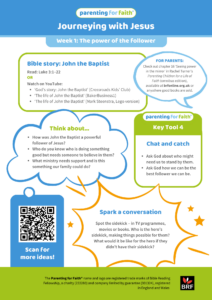Journeying with Jesus 1: The power of the follower
Week 1 of our Lent series 'Journeying with Jesus'
(For the whole series, click here: Journeying with Jesus.)
Getting started
There’s a lot out there about the importance of raising your child to be a leader. Schools now go out of their way to create a whole host of leadership positions for kids; online articles warn parents about the danger of your child being just a follower; leaders are celebrated and held up as role models.
Now, that’s not all bad. I have seen for myself the power of giving a child responsibility and watching them achieve. Some kids are born leaders and thrive under this responsibility, but many of us are happier not leading – and that’s okay. Just because someone is able or creative or quick-witted or charismatic doesn’t mean they have to be the leader. Maybe that’s not their role. And it certainly doesn’t mean that God can’t use them!
Bible story: John the Baptist
This week, the first in our Lent series ‘Journeying with Jesus’, we are looking at the story of John the Baptist and exploring what God has to say about following. Each week you’ll find a post like this with part of the Bible story, some things to think about and ideas for sparking conversation. Feel free to use it in any way that works for your family – whether that’s doing a bit each day you remember or looking at it all in one go.
This week’s story can be found in Luke 3:1-22. You might also want to read about John’s birth (Luke 1:5-25, 57-66) and his death (Matthew 14:1-12).
There are video versions available on YouTube:
- This video from Crossroads Kids Club
- The story of John the Baptist’s life and death shown with contemporary footage
- And a Lego version here covering the whole of John the Baptist’s life.
Digging deeper
Very often our kids feel powerless to influence things. They are only the children, used to the teacher, parent or adult saying what they can and can’t do. Often the power they are given is token – the captain of the team, a monitor at school, voting for the school council. And around them they see a world where people who are popular or beautiful or rich seem to have all the power.
In Rachel Turner’s Parenting Children for a Life of Faith: Omnibus Edition, there is a chapter called ‘Seeing Power in the Mirror’. Rachel writes about the importance of helping children discover that they have natural God-given power and equipping them to use it well. And part of this is knowing that even when you aren’t the leader, you can still be incredibly influential and powerful because of the choices you make and the people you choose to follow – she references this video which you might like to watch.
Think about Jesus and his disciples. Jesus was one man doing great things, but it was his disciples, empowered by the Holy Spirit, who took his message around the world.
Being a follower is a powerful thing. I have explained this to children using little sets of figures. There, on their own, is one person with a great idea, or a great cause – and over there is everyone else. What does that lonely person need to help them with their great idea or good cause? They don’t need someone to have the great idea again. What they need is people who catch their vision, their excitement and come along and say ‘I’ll help!’ Those people, those followers, then become powerful people who help to make things happen – like the disciples did with Jesus.
So this week, encourage your kid that they can be powerful just by whom they choose to support.
Things to think about:
- How was John the Baptist a powerful follower of Jesus? Wonder what difference he made to Jesus personally and to his ministry? If John hadn’t been shouting out God’s message, would Jesus’ job been more difficult?
- Who in your community, church or school is doing something good but needs someone to believe in them and add weight to their voice?
- What ministry needs financial or physical support and is this something our family could do?
- Chat and catch with God about who might need us to stand by them and be the best follower we can be?
Sparking conversation
Here are some ideas for sparking conversations about the power of being a follower:
- Play ‘Spot the sidekick’ in TV programmes, movies and books or the news. Who is the hero’s sidekick, making things possible for them. What would it be like for the hero if they didn’t have their sidekick?
- Followers can be incredibly powerful. What can you discover from these stories? Aaron, Moses’ sidekick (see, for example, Exodus 4:1-17; 5:1-12; 7-11; 17:8-16); Jesus’s sleepy disciples (Mark 13:32-42); Ruth (Ruth 1-4).
- When you are somewhere like a hospital or at church, think about who are the leaders, the people in charge, like the doctors or the minister. But who else is working behind the scenes to make sure they can do their job well?
- Discover the story of William Wilberforce, who joined the anti-slavery abolitionist movement and became a powerful follower.
- Talk about who or what do you follow and why? Is there anyone or anything your child would like to add their weight to but needs your support to do so? How can you help them surf that wave?
- Create windows into your own experience by sharing stories of times you have been a leader who’s been helped by a powerful follower, or when you’ve been a great follower.
- What other words could you use instead of ‘follower’? What about ‘fan’ or ‘second in command’? What else can you think about – and why have you chosen the word you have?


